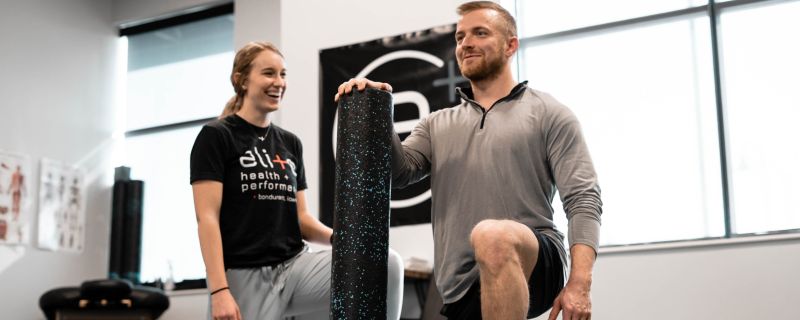Dreaming of studying in the UK?
For some universities/courses in the UK it is important that you
apply before January 14th as this is the deadline for equal consideration.
For more information on whether this deadline applies to you:
I really enjoyed my program at Oxford Brookes

I applied to study in the Pre-Registration MSc Physiotherapy course at Oxford Brookes University and received my unconditional offer to start the following year. I had applied to physiotherapy programs in Canada, UK and Australia this year and ultimately, receiving the offer to the UK solidified what I already knew – I wanted to study in the UK. I had many reasons to make this decision; I had family living in Ireland, I had friends from home and trips I previously taken who lived in the UK and I wanted to be close to mainland Europe to travel.
I used Across the Pond to apply to the UK both times I applied to study. I previously had an offer to Brunel University but wasn’t able to accept at the time for other circumstances. Both times applying, I had advisors who helped me start the application, guide me on writing personal statements, getting the right paperwork and answering all of the millions of questions I had. I have recommended them to all my friends who have at any point considered studying in the UK, because it made my life so much less stressful!
Finding Home Away from Home
When I moved to Oxford, I had found accommodation online a few months ahead of time. I chose not to stay in the university accommodations because I felt as a ‘mature’ student, I didn’t want to live in the residences and be distracted by potential younger students who were also wanting to have more fun. I had ‘been there, done that’ and I knew I wanted more comfort. I found a house share with 5 strangers, who all happened to be PhD students or Post-Docs at Oxford University and I was very lucky that we all were roughly the same age, and all from different countries – China, Italy, Belgium, and India. In the two years we lived together, we became close friends and I’m happy to say 2 years after moving out, we are all still in touch although we have moved separate ways. They became my family away from home, we cooked and shared meals together, celebrated our highs and supported each other’s lows together. I’m grateful to have met them.
In Oxford, it never seemed to be an issue to find a room or a house for rent. There is the peak season of doing so, I heard from friends that if you were looking to move into a house together, you had to plan ahead in advance, as often you’d sign the agreement 2-3 months prior to moving in! I would recommend generally viewing a place before moving in, I got super lucky not viewing the house, however, I was able to speak with my housemate on the phone ahead of time to get an idea of the vibe. I managed to snag the largest room in the house; I had my own en-suite because I knew I didn’t want to be sharing a bathroom with anyone or potentially cleaning up after people when their cleanliness standards didn’t meet mine (certified germ freak!). I think the price I paid was on the higher end of what you could find, but given the people I lived with and the proximity to campus, I was fine to pay this and had budgeted ahead of time to account for this. You’ll find a lot old houses in the UK, so be prepared for drafty windows and creaky floors, hopefully avoiding any leaky rooks or unwanted rodents (both I heard through friends).
I was super lucky when I signed my house share agreement, I didn’t realise I would be a 10-minute walk to campus! I lived in the residential area of Marston, a 20-minute walk to the John Radcliffe hospital, 45-minute walk to the Churchill Hospital or 30-minute walk into the high street and train station. I had classmates who drove or took the train in, others lived within Oxford in areas such as Headington or Cowley. Jericho is a touch farther, but still easily commutable. Most people in Oxford have a bike, this makes getting around so much easier! I think my life changed for the better once I secured a bike at the end of my 1st year, my house mate sold it to me since he decided to get a car instead for his own leisurely activities. Having a bike made nights out easier but also getting to campus, grocery shopping and placements. I would DEFINITELY recommend, and you don’t need anything fancy because they do get stolen sometimes, so just get a bike that works and a good lock!
Working in Oxford
I had to work to support myself while studying abroad, and I was really fortunate to get a part time job at the Up in Arms Pub in Marston, right across campus and a short walk from my house. I enjoyed working here; it was something I had never done and I now get to say I worked in a pub in the UK! How iconic! The team was supportive, fun and a great way to switch off. I got to know the regulars who would come in and create relationships with the people in the local community alongside other students who studied in Oxford. I also worked with a local events company and this was flexible, so I worked it around my pub job, classes, studying and placements. I was able to see the inside of the Sheldonian Theatre while working graduations or concerts, I worked weddings and events in The Divinity School (big moment for my inner Harry Potter nerd) to name a few things I did.
The ACTUAL Physiotherapy program
I really enjoyed my program at Oxford Brookes, I felt like we had a close-knit group of 20 students in my year. 6 of us were Canadian which was really nice, I remember within those first few weeks we celebrated Canadian Thanksgiving together and the following year we had everyone on the course join us for Thanksgiving. Professors were engaging and helpful and clearly enjoyed teaching and most of them still had clinical roles in their specialities. They were available for additional support as we needed and took our preferences on board when asking for placements. I was quite lucky again, in that, 4 of 5 placements were local in Oxford, only 1 was a distance away but 3 of us were placed there and one of them had a car so we were able to carpool together. We had the opportunity to apply to support the local rugby team as student physiotherapists to develop our clinical skills in a more professional setting where we weren’t getting graded like our placements. We had the options to do lots of group work and self-directed study to learn independently. If we needed to book facilities to practice our skills in the lab, this was also available.
The course offered students a chance to go on a sports massage course or Pilates course, not covered financially, so you’d have to self-fund, but you could then use those skills to work for yourself or a clinic to further your experience and confidence. I heard good reviews from both from classmates that attended.
Exploring the UK
I chose Oxford, because it’s an iconic location in the UK on its own but also its proximity and closeness to everything else you’d want to explore.
In my first year, the university offered weekend day trips organised for a small fee to different locations around the country. I went to Cardiff, Stratford Upon Avon, Isle of Wight and Cambridge. London is a quick train ride or you can take the Oxford Tube which runs all night and is particularly helpful during any cancelled trains.
I had friends in London, Canterbury and York who I caught up with. When I met my boyfriend, he took me to Suffolk where he was from and I got to see a different side of the country. My sister lives in Ireland, I was able to get cheap flights over from Birmingham Airport to see her and when she got married, she chose Portugal for a destination wedding, so was able to go visit beforehand. My friends came to visit from Canada and we went to Hungary and Germany and attended Oktoberfest, what a fun event and we can’t wait to go back in the future.
I’ve now moved to Kent since graduation and working in the NHS as a physiotherapist and not having to study every weekend, means I’ve been able to explore more. My boyfriend and I have been to Bath, Norfolk Broads, and Dover to name a few spots. We visit friends in London, Oxford, Winchester as hangouts arise. We’re hoping to make our way to Scotland and Devon in the next year and explore different parts of England.
- Henrietta

University of London
Study at the University of London?
Dreaming of studying in London? Are you wondering what to study at the University of London? Maybe you want to live and study in one of the biggest and most exciting cities in the world? We can help you make your dream come true! London is a fantastic city with many exciting universities and courses to choose from.

A Brief History of Higher Education in the UK
Written by Advisor Lauren - 14/11/2025
The United Kingdom has a long history of education, specifically university education, dating back hundreds of years. Join our advising team as we discuss the history of higher education in the UK and learn how you can become part of its academic success!
*When discussing the dates of the universities below, we have discussed them in relation to the date they were established as universities, not necessarily when their educational college or counterparts were founded.
Educational Beginnings
Following the Roman traditions, education in the UK began as an oral tradition. In the late 6th century, cathedral schools were set up in England, which began a tradition of education being linked closely to the church. This continued on until well into the 19th century, which brought about state funded schools, and education for all schools.
In Scotland, organized education began in the Middle Ages, and again, was closely linked to the church. Education for girls also began in the 15th century, and the Education Act of 1496 made it compulsory for boys of the upper class to attend grammar school. The Scottish Reformation also encouraged education, with the expansion of educational institutions.
Ancient Universities
The UK has some of the world’s oldest universities, dating back to 1096, making the University of Oxford the third oldest university in the world. With their historic architecture, centuries of learning, and academic traditions, the opportunity to study at some of the world’s oldest institutions is a huge draw for studying in the UK.
Across the Pond partners with three of the oldest UK universities – University of Aberdeen (1495), Durham University (1832), and Aberystwyth University (1872). University of Aberdeen is considered an Ancient University!
University of Aberdeen is the third oldest university in Scotland, founded in 1495 by William Elphinstone, Bishop of Aberdeen and Chancellor of Scotland. The university has educated many notable figures over the course of its history, including, Simon Fraser (11th Lord Lovat, a Scottish Jacobite), and more recently, actor Iain Glen. They also have notable Canadian graduates, including Eric Hoskins, who served as Ontario Minister of Health and Long-Term Care!
While not partnered with the other ancient universities, some of our other partners do have connections! For example, if you study at Oxford Brookes University, you get access to University of Oxford’s historic Bodleian Library. Why not check out Edinburgh Napier University, which allows you to study in the historic city of Edinburgh for a lower cost?
The University of Strathclyde is also of note – founded in 1796 as the Andersonian Institute, it did not receive a royal charter granting it university status as the University of Strathclyde until 1964.
Nineteenth Century Universities
For several hundred years after the founding of the ancient universities, no new universities were successfully founded in the UK, until 1832 with the foundation of Durham University. Several universities followed throughout the UK, including the first university in Wales!
Across the Pond partners with Durham University (1832), Aberystwyth University (1872), Queen’s University Belfast (1850), and several universities that now comprise the University of London Group (1836).
Durham University was founded in 1832 by an Act of Parliament during the reign of King William IV. As one of the top five oldest universities in England (its place is contested, occasionally called the third oldest), with attempts being made to establish a university near Durham Cathedral dating back to 1540, as previously monks from the cathedral would study at Durham Hall at Oxford. Notable alumni include Thomas Horrocks Openshaw (surgeon known for involvement in Jack the Ripper case), Timothy Laurence (husband of Princess Anne), Ed Gamble (comedian), and Nick Mohammed (actor of Nathan Shelley on Ted Lasso). Durham is well known for their law studies, as well as their studies in Archaeology, Classics, History and Theology.
Aberystwyth University is the oldest Welsh university, founded in 1872 as University College Wales, Aberystwyth. Most notably, King Charles III studied at Aberystwyth, becoming proficient in Welsh. Aberystwyth is well known for their research, academic excellence, and student experience, with a stunning coastal campus.
Queen’s University Belfast started as Queen’s University of Ireland in 1850, eventually becoming Queen’s University Belfast in 1908. The university is well known for their Law and Political Science studies. Their notable alumni include Liam Neeson (actor), and Lisa McGee (playwright and screenwriter).
The University of London was founded in 1836, and consists of seventeen member institutions, several of whom Across the Pond partners with. Royal Holloway, University of London was opened in 1886 by Queen Victoria herself. St. George’s University of London was founded in 1838, and is now City St. George’s, University of London. Further universities were added in the 19th and 20th centuries, including our partners Goldsmiths, and SOAS!
Civic Universities
In the 1900’s, the UK saw a new type of university – Civic Universities, which admitted students with no deference to their religious affiliation. Previously, education was highly linked to religion. These universities focused on practical skills, and are often linked with the study of engineering. There were two waves of civic universities – those established by Royal Charter before World War I, and those founded pre-1960. These universities are often defined by their architecture – first wave universities are known as “red brick universities”, whereas second wave are known as “plate glass universities”, as their campuses character them.
Even though its roots began in 1950, Queen’s University Belfast is also considered a first wave civic university, as it was established independently in 1908. Some of its contemporary Across the Pond partners include University of Birmingham, which was the first civic university to be awarded full university status in 1900, with the merger of Mason Science College (founded 1875) and Queen’s College, Birmingham (founded 1828). University of Leeds was established in 1904, followed by the University of Sheffield in 1905.
The second wave of civic universities were founded after WWI and include two of Across the Pond’s partner universities. University of Exeter was established in 1955 and traces its origins from the University College or the Southwest of England (1922) and Exeter School of Art (1855). The University of Leicester was established in 1957, and was developed from Leicestershire and Rutland University College, founded in 1921 and renamed to University College, Leicester in 1927, before settling to the University of Leicester in 1957.
A few civic universities also received status a bit later but are formally recognized to align with the red brick universities of the first wave. These include University of Dundee (1967), and Newcastle University (1963). Dundee was first founded as University College, Dundee in 1881, and was part of University of St. Andrew’s from 1897 to 1967. Newcastle was originally part of a medical school in association with Durham University in 1834, and was part of Durham University of 1908 to 1963, becoming independent through an act of parliament.
1960’s Universities
The 1960’s was a period of educational growth for the UK, with the number of universities more than doubling. These universities are a combination of plate glass universities, like those of the second wave of civic universities, and colleges of advanced technology. In 1963, a report called the Robbins Report recommended the expansion of universities in the UK, through giving all colleges of advanced technology the status of a university. Instead of submitting to external examination, these universities were the first to have their own degree awarding powers.
Our partner universities founded in this era include University of Sussex (1961), University of York (1963), University of Strathclyde (1964), University of Essex (1965), Loughborough University (1966), University of Surrey (1966, but traces its origins to Battersea Polytechnic Institute founded in 1891), and the University of Stirling (1967).
1980’s Universities
After a boom of universities in 1960, no new universities were founded until the 1980’s. Even then, only two universities were established in this period, and one was a merger of two universities founded in the 1960’s!
Across the Pond works with one of these universities – Ulster University, which was established in 1984. Ulster was formed by a merger of the New University of Ulster (founded in 1988) and Ulster Polytechnic. In 2014, they officially rebranded to Ulster University.
1990’s Universities
In 1992, the Further and Higher Education Act was passed, which allowed all polytechnic and Scottish central institutions to become universities and award their own degrees. This again doubled the number of UK universities. Commonly, these are referred to as “new universities” or “post-1992 universities”, though many of the universities have heritage dating back to the 1800’s!
With the passing of this Act, in 1992, many universities were created back-to-back. These include University of Brighton, which was founded as Brighton Polytechnic in 1968; De Montfort University, founded as Leicester Polytechnic in 1969, and with roots in Leicester School of Art (1870); University of Derby; University of Hertfordshire, originally founded as Hatfield Technical College in 1952; University of Huddersfield, originally part of the Young Men’s Mental Improvement Society (1841), and Huddersfield Technical College from 1896; Kingston University London, which started as Kingston Technical Institute in 1899; Leeds Beckett University (formerly Leeds Metropolitan University), which traces its roots to Leeds Mechanical Institute (1824); London South Bank University, which was Borough Polytechnic Institute from 1892; Middlesex University, formerly established as Middlesex Polytechnic in 1973; Edinburgh Napier University, originally founded as Napier Technical College in 1964; Oxford Brookes University, founded as Oxford School of Art in 1865; and Robert Gordon University, which was developed out of Robert Gordon Hospital (1750).
21st Century Universities
There are several universities that have been founded in the 21st century – but don’t let the dates fool you, many of these universities have history dating back to previous centuries! If you’re looking for a modern universities with all of the latest teaching methods and technology, why not check out some of our “newer” partners! Universities such as London Metropolitan University, founded in 2002 founded from the merger of two universities dating back to 1848 and 1896, or University of Roehampton (2004) which was founded from constituent colleges dating back to 1841.
University of Chester was established in 2005, but it dates back as a training college to 1839. From 1910, degrees were awarded by University of Liverpool, until they became a university of their own. University of Winchester was established in 2005 but was founded in 1840 as Winchester Diocesean Training School. Solent University, Southampton began as a private School of Art in 1856 but was established as a university in 2005.
Founded as teacher’s college in 1946, University of Worcester was established in 2005, and is still known for their teaching and midwifery studies today! In terms of other specialized study, the University of Law, while established in 2012, was originally the College of Law, founded in 1962. As well, Falmouth University was also established in 2012 but began as Falmouth School of Art in 1902.
How to Take Part
Are you interested in studying in a country with a long history of top tier education? No matter what era you are interested in, there is a university in the UK that will be the right fit for you! Whether you want to study law at a historic law school, or you’re interested in studying physiotherapy in a state of the art institution, the UK has a place for you!
Sign up for an advisor today, and they can help you find the perfect university! Whether you want to study somewhere with hundreds of years of history, or the most modern facilities, the UK has something for everyone!

Why You Should Study Physiotherapy in the UK
Physiotherapy remains a popular subject for Canadians looking to study at UK universities.
If you've been thinking of taking your physiotherapy studies abroad, join our advising team as we discuss some key concerns from Canadian students. Why should you study Physiotherapy in the UK? What are the benefits of a UK physiotherapy degree? What are the entry requirements for the program?
Register now to see how Across the Pond can help you achieve your dream profession!
Why Study in the UK?
Why study in the UK?
Discover the advantages to choosing a university in Britain! We would be happy to tell you even more about all the opportunities and advantages of studying in the UK.
Finish your Degree Faster
Your education does not have to take ages. A three-year Bachelor’s and one-year Master’s lets you get straight to the point, requiring you to take only those classes which relate to your major. You will walk away with a respected degree from a distinguished university that is transferable around the world.

Explore UK Studies: Alternatives to Physiotherapy
Physiotherapy remains a popular subject for Canadians looking to study at UK universities, but high demand and limited places for international students can sometimes lead to disappointment and result in not getting into a physiotherapy school. Keep calm, and let Across the Pond help you reassess your options! In this informative webinar, our team will discuss potential back-up options and alternative career paths for passionate students eager to pursue allied health professions. With similar background requirements, and application expectations, Across the Pond's expert advisors can help give you the best possible chances of success whether as a first-time applicant, or as a re-applying student looking to improve their application.
Register now to secure your spot and receive insider tips that improve your chances of studying physiotherapy (or a related profession) at one of our UK partner universities.


